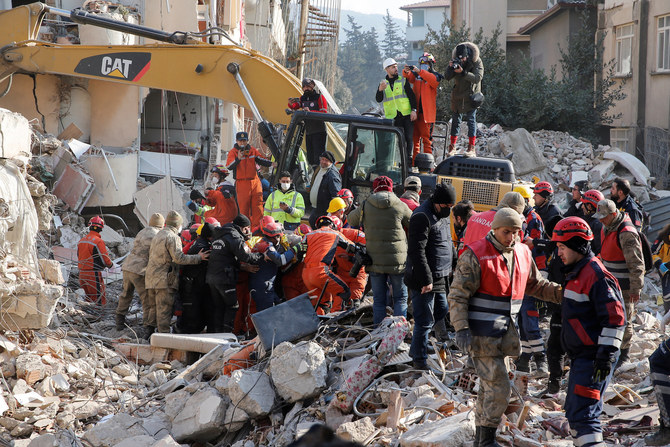ANKARA: As rescue efforts continue following the devastating earthquake on Monday, the death toll in Turkiye and Syria combined has surpassed 33,000, and is likely to increase.
Among those rescued alive are Turks, Syrians, Afghans and other refugees, many of whom were concentrated in cities in the area.
Of the 3.6 million registered Syrian refugees in Turkiye, about 1.6 million are living in the region affected by the earthquakes.
There is, however, no official record about the casualties and survivors among the refugee community in Turkiye.
The chaotic environment is likely to fuel an already strong anti-refugee sentiment in the country.
Under normal circumstances, Syrian refugees have to get the permission of provincial authorities to change the city that they are registered in, but given the extraordinary conditions, this stipulation has temporarily been removed.
Syrian refugees who have been living in the earthquake-hit zone can now relocate to another city for a duration of up to 90 days, excluding Istanbul.
In the meantime, Syrians living outside the quake-hit zone and who cannot reach their relatives because of the disruption have not able to travel to the disaster zone because they are not permitted legally to change city without an official paper.
Metin Corabatir, president of the Ankara-based Research Center on Asylum and Migration IGAM, told Arab News: “We are getting up-to-date news from the region and the majority of the Syrians (there) had their houses completely demolished, and they are now homeless. Children are staying in the streets, they are hungry.”
One major concern among Turks is that Syrians whose houses were destroyed could relocate to big cities and change local demographics.
After some neighborhoods in several cities from Adana to Hatay and Istanbul were turned into Syrian enclaves, new “Little Aleppo” examples could emerge in the days to come.
For Corabatir, this is inevitable because Syrians who were living in the quake-stricken zone mainly worked in small industrial zones as part of a large unregistered labor force.
“As these industrial zones were also destroyed, they will be obliged to find new jobs in other neighboring cities. It will therefore trigger a new emigration within the country,” he said.
About 27 camps were already established for Syrians in Turkey, and authorities are now working on expanding these camps to relocate Syrians to them.
Several municipalities in the region have reportedly prevented Syrian families entering the tent zones set up for the quake-affected local community.
Experts, meanwhile, have warned against the negative impact of spreading fake news about refugees in Turkey.
Turkey’s Masterchef 2018 winner Ugur Kardas was jailed on Sunday after he falsely claimed a corpse pulled from the rubble of a collapsed building had been robbed by Afghan refugees.
“Against the backdrop of growing anti-immigration sentiment, … coupled with an increasing frustration from the deepening economic crisis and from the incumbent government, migration has in the last couple of years become a new driver of political competition,” Sinem Adar, an associate at the Center for Applied Turkey Studies in Berlin, told Arab News.
According to Dr. Adar, the devastating earthquake, the government’s late and inadequate response, and manipulation by political actors such as the leader of the marginal far-right Victory Party add insult to injury, turning refugees and irregular migrants into an open target of exclusionary and even violent treatment.
“This is a time when the principle of safeguarding public good should guide policy-making,” she said.
“In the case of refugees, this means ensuring their access to earthquake relief, accommodation, and healthcare,” she added.
“Given the insufficient government capacity and lack of coordination among institutions, it is unclear whether this daunting task will be accomplished or not,” said Dr. Adar.
Recently, more misinformation was shared about the government allegedly relocating only Syrian quake survivors to a women-only dormitory in the southern province of Mersin and not admitting Turkish survivors.
Some fake videos were also shared online about Syrian refugees smoking shisha in the dormitory building, and watching pornography.
A Turkish opposition lawmaker visited the dormitory to prove that there were Syrians but also Turkish survivors, and no obscenity was identified.
Some videos claiming that Syrians and Afghans were carrying out looting in the region, and misleading photos about Syrians being beaten after they were engaged in looting, also triggered anger among Turkish citizens, although no evidence supported these claims.
Some political parties, like the anti-refugee Victory Party, also took advantage of the disaster to blame Syrians for looting.
“These news (stories) are triggering a fear mechanism. They are even spreading news that Syrians will buy all the quake-stricken buildings of Hatay to get the supremacy,” Corabatir said.
On a positive note, some media outlets also covered Syrian donors in other Turkish cities donating blood to earthquake survivors and helping with search and emergency aid efforts.
Some Syrian shop owners in quake-hit Maras also offered vital goods to survivors by putting fruit and vegetables on the sidewalks.
“Municipalities should also not discriminate against refugees as it could be perceived as a supportive argument for the already existing and escalating anti-Syrian sentiment in the quake-affected zone,” Corabatir said.























